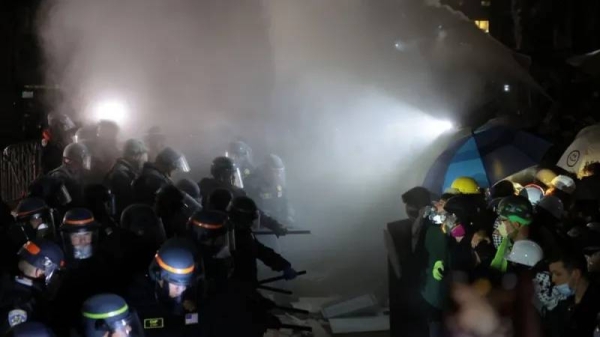In a recent incident at the University of California, Los Angeles (UCLA), hundreds of police officers in riot gear cleared a pro-Palestinian encampment after more than 1,000 protesters were ordered to leave the area. The site, which was erected a week ago, was dismantled as officers used flash bangs and flares to disperse the crowd. Over 100 demonstrators were reportedly detained in the raid. This event is part of a larger movement of student-organized pro-Palestinian rallies and encampments that have spread to over two dozen states and at least six other countries. The protests have led to over 1,000 arrests across the country, prompting President Joe Biden to address the wave of protests from the White House, urging participants to uphold the rule of law and avoid violent protests.
The protests, which are pushing for a ceasefire in Israel’s war against Hamas, have led to demands for academic institutions to financially boycott Israel and companies profiting from the conflict. However, Jewish students have reported feeling unsafe on campus due to rising reports of antisemitic incidents and harassment, prompting university leaders to come under pressure to rein in the protests. The tensions at UCLA escalated when a masked pro-Israeli group attacked campers on campus, leading to criticism of the police response. Despite regaining control of the area, law enforcement maintained a tight security cordon and declared the pro-Palestinian gathering “an unlawful assembly”.
During the raid, police officers in riot gear used flash bangs and other tools to disperse the protesters, leading to some demonstrators fleeing the scene while others held firm. Reports suggest that rubber bullets were used, along with other “less than lethal” weapons to break down the encampment and detain protesters. Campus operations were limited following the incident, with classes moving to remote instruction and the community advised to avoid the area. The protest movement continues at universities across the country, with some institutions considering divestment proposals from student representatives.
The dissent among young Americans at universities over the war in Gaza has led to arrests at various campuses, including Yale, Dartmouth, and the University of Wisconsin. The demonstrations have raised concerns about the safety of students, disruptions to college life, and the need to maintain order and respect the rule of law. President Biden emphasized the importance of peaceful protests and condemned violent actions such as vandalism and property damage. As the protests continue to gain momentum, academic and political leaders are working to address the concerns of students while ensuring the safety and security of all individuals on campus. The events at UCLA highlight the growing tensions surrounding the Israeli-Palestinian conflict and the challenges universities face in managing protests and dissent among their student populations.
Overall, the incident at UCLA reflects the broader movement of pro-Palestinian protests that have taken place across the country in recent weeks. The protests have called for a ceasefire in Israel’s conflict with Hamas and demanded academic institutions boycott Israel and companies profiting from the conflict. While the protests have drawn attention and support from many, they have also raised concerns about safety on campus, disruptions to college life, and the need to maintain order and respect for the rule of law. As the demonstrations continue, universities are under pressure to address the concerns of students while ensuring the safety and security of all individuals on campus. The events at UCLA highlight the challenges faced by academic and political leaders in managing protests and dissent among young Americans at universities nationwide.











